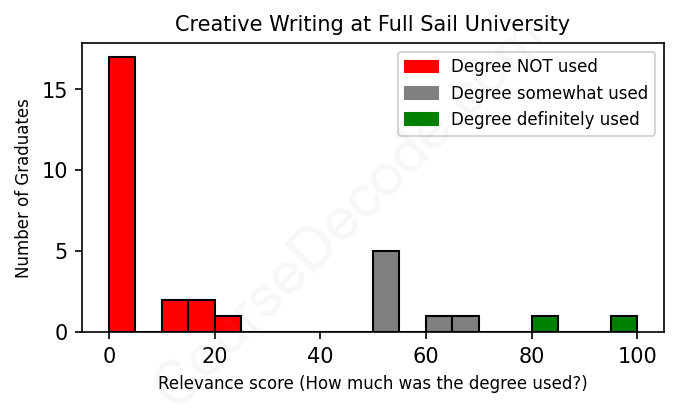
First, some facts. Of the Creative Writing graduates from Full Sail University we've analyzed , here's how many have used (or NOT used) their degree in their career:

These are estimates based on AI analysis of 31 LinkedIn profiles (see below).
The verdict? Horrible! Overall, with an average relevance score of 21%, Creative Writing graduates from Full Sail University have an exceptionally lower likelihood (-46%) of finding work in this field compared to the average graduate across all fields:
And for comparison, here's the chart for all profiles we've looked at across all degrees.
Also, after graduating, only 12% of these graduates have pursued further education other than another Bachelor's degree (such as a Masters degree or other), compared to the average across all profiles of 35%. This suggests a Bachelors degree is enough for most Creative Writing graduates, and it's normal to look for work straight after graduation.
See the details:
|
Relevance score: 3% We think this person has NOT gone into a career related to their degree. We think this person has NOT gone into a career related to their degree.
DEGREE INFOGraduated in 2016 from Full Sail University with a Bachelors Degree in Creative Writing. No other secondary education since. JOB HISTORY SINCE GRADUATIONGeneral Employee CARQUEST Distribution Center May 2017 - Aug 2017 Cap Team 2  Wal-Mart Oct 2017 - Feb 2018 Security Associate  Conduent Dec 2018 - Jan 2020 Census Employee  U.S. Census Bureau Jul 2020 - Oct 2020 Correctional Officer  Geo Group Nov 2020 - Mar 2021 Production Employee  Autocar Trucks Apr 2022 - May 2023 Quality Control Technician  TS Tech Americas, Inc. Aug 2023 - Feb 2024 ABOUT[NAME REMOVED] Stegner is a writer born and raised in New Castle, Indiana. With a BFA in Creative Writing obtained from Full Sail University, [NAME REMOVED] hopes to one day be free to pursue his passions that inspire his writing. |
The top 10 most common jobs done by the graduates we've analyzed (ranked most common to least) are:
After looking at the variety of jobs that people from Full Sail University’s Creative Writing program have taken on, it’s pretty clear that not many of them are directly using their writing skills in their careers. Most of the roles listed—like security officers, warehouse associates, or administrative positions—are far removed from the world of storytelling and creative writing. Even jobs that might seem to have a slight connection, like photography or business entrepreneurship, generally focus more on other skills rather than the specific competencies you'd expect someone to use after completing a Creative Writing degree. It's like they wrapped their degree in a box, and now they're working in completely different areas, often focusing more on practical or technical tasks.
However, there are some noteworthy exceptions! A few graduates have carved paths in roles that clearly utilize their creative writing skills, such as content writing, editing, and video production. For example, jobs like eSports journalist or content writer show that some individuals are indeed putting their storytelling talents to good use. Ultimately, while there are definitely some shining examples of Creative Writing graduates who are doing what they love, the overall trend suggests that many are finding themselves in jobs that don't directly relate to their studies. It raises an interesting question about how useful a degree in Creative Writing is in the real job market. If you’re thinking about this field, it might be worth considering how you can incorporate those valuable writing skills into various types of jobs, even the ones you might not anticipate at first glance!
Here is a visual representation of the most common words in job titles for Creative Writing graduates (this is across all Creative Writing graduates we've analyzed, not just those who went to Full Sail University):

So, checking out the career paths of graduates from Full Sail University's Creative Writing program, it's pretty clear that there’s a mixed bag of success stories. A handful of graduates seem to have launched what can be considered good careers relevant to their studies. For instance, a few have ventured into creative roles like writing and video production, which directly relate to Creative Writing. However, a substantial number appear to have drifted into jobs that are not directly linked to their degree at all. Many have taken on roles in various industries like customer service, security, or administrative positions. This suggests that while some found a niche in creative fields, others had to pivot quite drastically away from writing-related careers.
If we look at their first jobs right after graduation, the trend points more towards non-creative routes; many opted for roles like customer service or production. Fast forward five or ten years, and even more of them have taken positions that aren't closely tied to Creative Writing, and some have even started their own businesses in completely different areas. While there are definitely success stories among the grads, the overall picture indicates that a significant chunk of them may have to compromise on their initial creative ambitions in favor of broader employment opportunities. So, if you're considering this path, just keep in mind that it could lead to a variety of job markets, not just the artistic ones you might be hoping for!
Honestly, a Bachelor's degree in Creative Writing can be a little challenging but also super rewarding, especially at a place like Full Sail University, which is pretty intense with its fast-paced schedule. You're going to be doing a lot of writing, reading, and critiquing—basically, a lot of creative brainstorming and refining your voice, which can be tough at times. It’s not like you're just showing up to class and taking tests; you’ll find yourself pushing your creativity and getting feedback from your peers and instructors. So, while it might be easier than some hardcore science degrees, it's definitely not a walk in the park either. If you love writing and storytelling, you’ll find it fulfilling, but be ready to put in some serious effort!
Most commonly, in the LinkedIn profiles we've looked at, it takes people 3 years to finish a Bachelor degree in Creative Writing.
So, looking at these Creative Writing grads from Full Sail University, it seems like their career paths are all over the place in terms of making decent money. Some of them have found solid gigs, like the graduate who’s running their own business a decade after graduation, which can be lucrative if done right. However, a lot of others have jumped between part-time jobs or ones that don’t seem to pay that great, like customer service roles or retail positions, especially early in their careers. It’s a mixed bag, honestly—some are probably doing well, while others might be struggling to make ends meet. If you're thinking of following a creative path, it might help to also consider how to combine your passion with higher-paying roles to ensure you’re not just scraping by.
Here is a visual representation of the most common words seen in the "about" section of LinkedIn profiles who have a Bachelor degree in Creative Writing (this is across all Creative Writing graduates we've analyzed, not just those who went to Full Sail University). This may or may not be useful:

Here are all colleges offering a Bachelor degree in Creative Writing (ordered by the average relevance score of their Creative Writing graduates, best to worst) where we have analyzed at least 10 of their graduates:
| College | Score | Count |
|---|---|---|
 University of Central Florida University of Central Florida
|
58 | 17 |
 Florida State University Florida State University
|
56 | 15 |
 Columbia College Chicago Columbia College Chicago
|
54 | 10 |
 University of Washington University of Washington
|
53 | 11 |
 University of California, Riverside University of California, Riverside
|
45 | 10 |
 Southern New Hampshire University Southern New Hampshire University
|
44 | 26 |
 Western Washington University Western Washington University
|
44 | 10 |
 Full Sail University Full Sail University
|
21 | 31 |